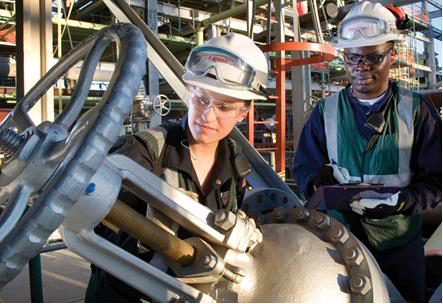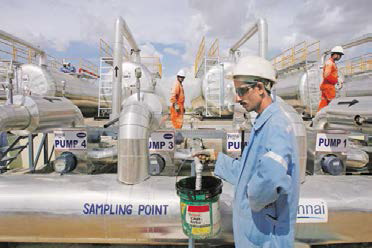COURSE OVERVIEW
PE0085 : Oil & Gas Field Operations, Start-up & Shutdown: Gas Processing, Hydrates, Dehydration, Sweetening, NGL Recovery & Fractionation, Oil Production, Desalting, Stabilization, Storage Tanks, Mixers, Meter Proving, Cargo Calculations, Flow Measurement, Start-up & Shutdown

OVERVIEW
| COURSE TITLE | : | PE0085 : Oil & Gas Field Operations, Start-up & Shutdown: Gas Processing, Hydrates, Dehydration, Sweetening, NGL Recovery & Fractionation, Oil Production, Desalting, Stabilization, Storage Tanks, Mixers, Meter Proving, Cargo Calculations, Flow Measurement, Start-up & Shutdown |
| COURSE DATE | : | Jan 05 - Jan 09 2025 |
| DURATION | : | 5 Days |
| INSTRUCTOR | : | Dr. Hesham Abdou |
| VENUE | : | Cairo, Egypt |
| COURSE FEE | : | $ 5500 |
| Register For Course Outline | ||
OTHER SCHEDULED DATES
| Date | : | Sep 29 - Oct 03 (5 Days) | Location | : | Cairo, Egypt | Classroom Fee (US$) | : | $ 5500 | Course Info |
Course Description
This practical and highly-interactive course includes various practical sessions and exercises. Theory learnt will be applied using our state-of-the-art simulators
Oil or gas wells produce a mixture of hydrocarbon gas, condensate, or oil; water with dissolved minerals, usually including a large amount of salt; other gases, including nitrogen, carbon dioxide (CO2), and possibly hydrogen sulphide (H2S); and solids, including sand from the reservoir, dirt, scale and corrosion products from the tubing.
For the hydrocarbons (gas or liquid) to be sold, they must be separated from the water and solids, measured, sold and transported by pipeline, truck, rail, or ocean tanker to the user. Gas is usually restricted to pipeline transportation but can also be shipped in pressure vessels on ships, trucks, or railroad cars as compressed natural gas or converted to a liquid and sent as a liquefied natural gas (LNG). This course discusses the field processing required before oil and gas can be sold.
link to course overview PDF
Oil or gas wells produce a mixture of hydrocarbon gas, condensate, or oil; water with dissolved minerals, usually including a large amount of salt; other gases, including nitrogen, carbon dioxide (CO2), and possibly hydrogen sulphide (H2S); and solids, including sand from the reservoir, dirt, scale and corrosion products from the tubing.
For the hydrocarbons (gas or liquid) to be sold, they must be separated from the water and solids, measured, sold and transported by pipeline, truck, rail, or ocean tanker to the user. Gas is usually restricted to pipeline transportation but can also be shipped in pressure vessels on ships, trucks, or railroad cars as compressed natural gas or converted to a liquid and sent as a liquefied natural gas (LNG). This course discusses the field processing required before oil and gas can be sold.
TRAINING METHODOLOGY
This interactive training course includes the following training methodologies as a percentage of the total tuition hours
LecturesWorkshops & Work Presentations
Case Studies & Practical Exercises
Videos, Software & Simulators
In an unlikely event, the course instructor may modify the above training methodology before or during the course for technical reasons.
VIRTUAL TRAINING (IF APPLICABLE)
If this course is delivered online as a Virtual Training, the following limitations will be applicable
| Certificates | : | Only soft copy certificates will be issued to participants through Haward’s Portal. This includes Wallet Card Certificates if applicable |
| Training Materials | : | Only soft copy Training Materials (PDF format) will be issued to participant through the Virtual Training Platform |
| Training Methodology | : | 80% of the program will be theory and 20% will be practical sessions, exercises, case studies, simulators or videos |
| Training Program | : | The training will be for 4 hours per day starting at 09:30 and ending at 13:30 |
| H-STK Smart Training Kit | : | Not Applicable |
| Hands-on Practical Workshops | : | Not Applicable |
| Site Visit | : | Not Applicable |
| Simulators | : | Only software simulators will be used in the virtual courses. Hardware simulators are not applicable and will not be used in Virtual Training |
RELATED COURSES

PE0655 : Rules of Thumb in Process Design
- Date : Dec 16 -Dec 19 / 3 Days
- Location : Dubai, UAE
- Course Details Register

PE0340 : HYSYS Steady State Process Simulation
- Date : Nov 11 -Nov 15 / 3 Days
- Location : Abu Dhabi, UAE
- Course Details Register

PE0115 : Process Plant Performance & Efficiency
- Date : Nov 18 -Nov 21 / 3 Days
- Location : Istanbul, Turkey
- Course Details Register

PE0485(OR1) : Crude & Vacuum Process Technology
- Date : Dec 15 -Dec 19 / 3 Days
- Location : Fahaheel, Kuwait
- Course Details Register
